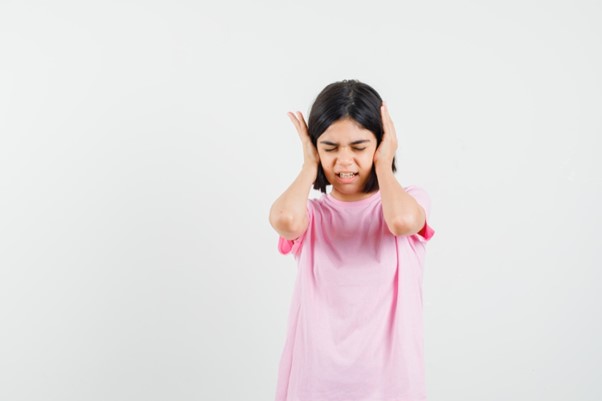Headache is a pain or discomfort in the head and is common in children. Sometimes a headache is associated with nausea and vomiting.
The two common types of headaches in children are:
- Tension headache: Occurs when the neck or head muscles get stressed out
- Migraine headache: Occurs due to specific triggers like physical activity, light, strong smell, or loud sounds
Symptoms:
Some of the common symptoms of headaches include:
- Sharp or throbbing pain
- Pain (head, neck, or face)
- Pale skin
- Dizziness
- Fever
- Blurred vision
- Sensitivity to light
- Nausea and vomiting
Causes:
The common causes of headaches in children include:
- Illness like the flu, an infection, or a fever
- Sinus infection
- Sore throat
- Ear infections
- Head trauma
- Stress
- Anxiety
- Depression
- Tension
Risk Factors:
The below factors increase your child’s risk of getting headaches:
- Stress
- Poor sleep
- Head injury
- Family history of migraines
Diagnosis:
Your child’s doctor will ask some questions about the symptoms and medical history:
The doctor would ask questions such as:
- Where is the pain?
- How do you feel?
- At what time do you get a headache?
- How long does the pain last?
The doctor will ask you the questions such as:
- Is your child’s sleep habit changed?
- Does your child have any emotional stress?
- Does your child have changes in behaviour?
Your child’s doctor can suggest more tests if any serious condition is suspected:
- MRI: This test uses large magnets and computer to produce the detailed images of the body organs
- CT scan: This test uses computer and X-rays to make detailed images of the body. It shows clear images of any body part
- Spinal tap (lumbar puncture): This test measures cerebrospinal fluid (CSF) pressure. It is also useful to check for an infection in the CSF
Treatment:
Simple home remedies work for mild headaches. This include:
- Rest in a quiet, dark environment
- Take medicines recommended by your child’s healthcare provider
- Manage stress
- Avoid foods and drinks that trigger headaches
- Get enough sleep
- Do not skip the meals
Migraine headaches may be treated with medicines, like:
- Abortive medicines: Your child’s doctor will prescribe certain medicines. They can stop a headache in progress.
- Rescue medicines are over the counter (acetaminophen) that halts a headache.
- Preventive medicines: These are prescription medicines that are taken daily to reduce severe migraine headache attacks
Complications:
Below are the complications that might occur with frequent headaches:
· Behaviour problems
· Problems with grades at school
· Depression
